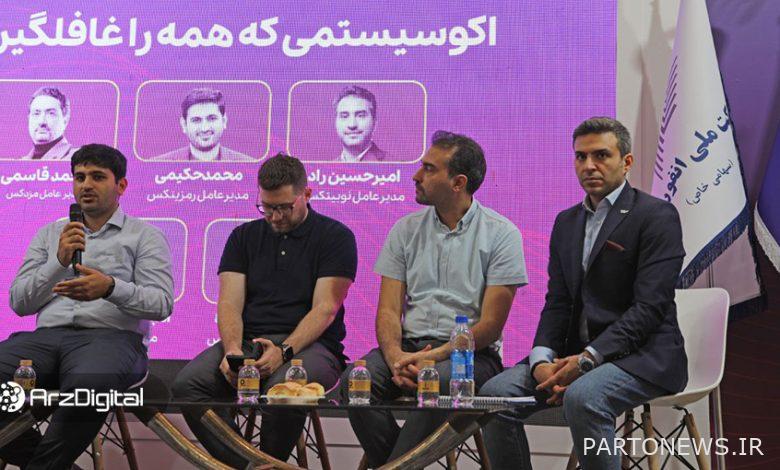“A wrong decision will take the opportunity of economic growth!”; The CEO of Valex Exchange said about the difficult obstacles facing Iran’s fintech industry

In the last four years, the cryptocurrency industry in Iran has grown on par with the world, but it seems that dark clouds have appeared in the sky of this industry, which requires quick and decisive decision to be resolved. Ehsan Mehdizadeh, the CEO of Valex digital currency exchange, pointed out the clear and sensitive situation of the cryptocurrency industry in Iran on the first day of the exhibition.
Yesterday and on the first day of the Elcomp exhibition, the panel “The ecosystem that surprised everyone!” It was implemented with the presence of CEOs of prominent exchanges in Iran’s fintech field.
Between the last Elcomp exhibition in 2018 and the current exhibition, digital currency exchanges have experienced a lot of growth and have occupied a large and significant part of the startup ecosystem.
Ehsan Mehdizadeh, CEO of Valex, answered the question of how this industry will grow in the next four years, and said, “Although we have reached the point of competition with the world in these four years, this growth is not certain because there is not much support for this industry.” In these years, the penetration rate of cryptocurrency and digital currency has increased in Iran, and in other words, it has an influence of 10-12% in the Iranian society, which is considered a large number at the international level. Mahdizadeh further mentioned Turkey; A country where this coefficient reaches 9%.
Mehdizadeh continued:
It is noteworthy that there are many supportive policies in Türkiye. Despite the support and freedom of action, a company like BTCTurk, whose product, website and application standards are lower than Iran’s standards, is valued at three billion dollars.
The executive director of Valex considers the result of these policies to attract capital and growth, while restrictive policies can lead to significant capital outflows.
He further added:
Four years ago, there were few companies operating in this space and most of the transactions were done underground, but now we can safely say that it is one of the few industries that competes with today’s industries, and this is one of the challenges that exist. Our competitors in this industry are not only domestic, because we offer a product that is offered all over the world with similarities and of course more independence. The collection of companies that are here provide the user with all the features in the world in the best way. Now it is available to users from various markets and coins to staking, credit transactions and bot trader.
Mehdizadeh emphasized that “despite the growth in these years, a large part of this capital is leaving the country due to the lack of trust not in investment platforms, but in Iranian legislation, and it is used in other platforms in other parts of the world and sometimes competes We lose to exchanges like Bingx, the only reason for this is the lack of support.
He continued by emphasizing this missed opportunity:
We must be able to manage in such a way that this capital is inside Iran. Now, with the efforts of the activists in this field in all businesses and despite the applicability and facilitation that has been created, this penetration rate in Iran’s inflationary society and these facilities, the cryptocurrency industry could have a high currency gain.
In part of his speech, Mahdizadeh said that despite the stonewalling, it is not easy to look at the bright future that many imagine for cryptocurrency in the world these days and hope to achieve it in Iran; Because this requires more support.
The lack of transparency of tax processes and problems in accessing the payment portal were among the important problems that Mehdizadeh mentioned.
He also added:
Sometimes we postpone the examination of the negative effects of a law until after its implementation, like the case that happened to mining. The former minister announced a ban on mining, but two years later, in the Economic Commission, they said that mining does not consume much electricity. Note that this topic could have a lot of currency.
In response to the question whether this outflow of capital is exaggerated or not, Mehdizadeh called it serious and real with the example of South Korea. According to Mehdizadeh, in 2017, South Korea, which had not yet planned tax processes for cryptocurrency, experienced a trade volume of over 3.5 billion dollars. But in 2021, the year when South Korea enacts tax laws and is considered the year of the bull and growing cryptocurrency, the trade volume will fall by 83% to $650 million.
The executive director of Valex also emphasized that “using this opportunity to preserve capital in Iran and gain currency is the concern of the industry’s activists, and they are trying to be decision makers and create different solutions to preserve users in Iran.”
In the end, in response to the question of whether digital currency exchanges are the star of Alcomp, Mehdizadeh said that despite the global trend and the movement of the economy towards presence in the form of fintech, this industry is the star of Iran’s startup ecosystem, whose activists compete with global examples. It is hoped that with supportive decisions, this industry can continue to grow.

